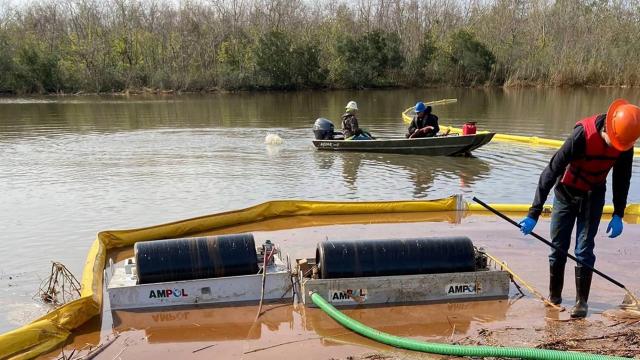A decades-old pipeline spilled 1,192,404 l (1.2 million litres) of diesel into an environmentally sensitive area in Louisiana last month, killing thousands of animals, the AP reported Thursday. The spill happened a little over a year after a safety inspection found that the pipeline was severely corroded — but the pipeline’s owners chose to delay repairs and keep it operational.
Documents from the Pipeline and Hazardous Materials Safety Administration (PHMSA), which were first reported by the AP, show that a rupture in the Meraux Pipeline was discovered in late December at the Chalmette Refinery in St. Bernard Parish, just outside of New Orleans. (The breach hasn’t been reported until now). Officials say most of the diesel fuel spilled into storage ponds around the pipeline, but some also got into the soil and environmentally sensitive habitats nearby.
There haven’t been any human casualties as a result of the spill, but “thousands” of animals, including 32 birds, 39 snakes, and more than 2,000 fish, are dead, according to the Louisiana Department of Wildlife. Most of the diesel has been cleaned up, officials say, but the company that owns the pipeline is still working. Dozens of animals, including more than 70 alligators, as well as a collection of birds, snakes, and turtles, were affected by the spill and sent to “rehabilitation.”
The Meraux Pipeline, which transports diesel fuel over 200 kilometres from New Orleans to a storage terminal in Mississippi, is more than 40 years old and operated by Collins Pipeline Co. PHMSA documents show a safety inspection from October 2020 found that a 7-metre section of the pipeline was corroded — right around where this year’s spill was found. That inspection found that 75% of the metal was corroded, which normally would mandate immediate repair. However, Collins decided to keep the pipeline operational and delay repair after another inspection reassessed the damage and allowed it to stay in service.
Last October, a representative from the owner of Collins Pipeline, PBF Energy, sent an email to PHMSA noting that the company had repaired a different section of pipeline but was still waiting for approval to go ahead and fix the corroded stretch in St. Bernard Parish. The poor conditions of the pipeline aren’t just a recent development, though. In 2011, federal regulators opened an enforcement against Collins Pipeline, charging that the company wasn’t performing external corrosion tests on equipment often enough.
“It’s especially maddening to learn that Collins Pipeline’s initial analysis deemed the pipe in such poor condition that it warranted an immediate repair,” Bill Caram, the executive director of the Pipeline Safety Trust, told the AP.
The owner of the pipeline, PBF Energy, is not as recognisable a name as some other oil and gas companies. But since its formation in 2008, PBF has acquired refineries from Big Oil players; its holdings currently include facilities once owned by Valero, Sunoco, Shell, and Exxon. In 2016, two PBF-owned refineries were named in a report from Amazon Watch as some of the U.S. refineries that processed Amazon crude oil — which is especially damaging to the rainforest — alongside refineries owned by Shell, Exxon, Chevron, and Phillips 66.
